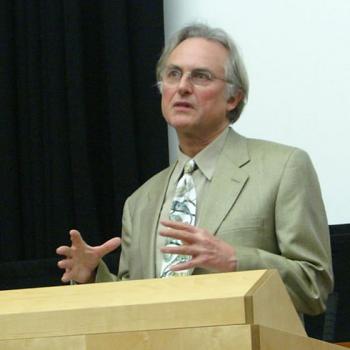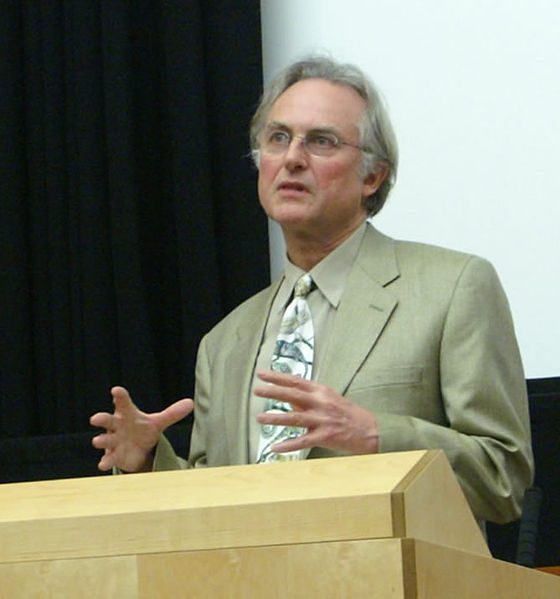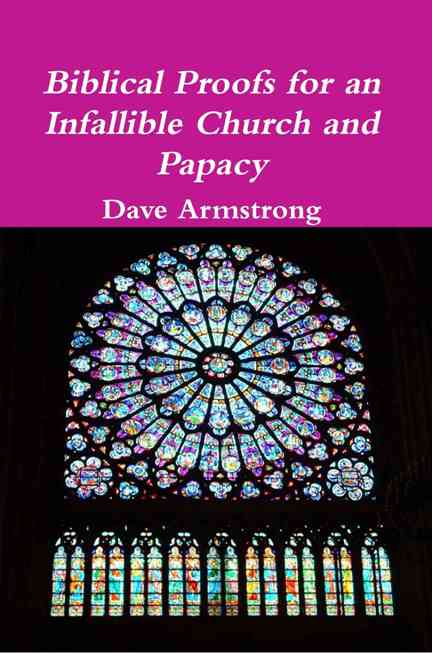
This is one of four critiques of the book, The God Delusion (New York / Boston: Houghton Mifflin Company, 2006), by perhaps the world’s best-known (and most influential?) atheist, the biologist Richard Dawkins (born in 1941). His words will be in blue. Links to the four critiques follow:
Richard Dawkins’ The God Delusion: General Critique
Richard Dawkins’ “Bible Whoppers” Are the “Delusion”
Richard Dawkins: D- Grade for Science & Christianity
Richard Dawkins’ Outrageous Hypocrisy on Abortion
***
[all Bible passages cited by myself are RSV]
Dawkins describes God in a way remarkably similar to how Democrats describe Republicans:
The God of the Old Testament is arguably the most unpleasant character in all of fiction: jealous and proud of it; a petty, unjust, unforgiving control-freak; a vindictive, bloodthirsty ethnic cleanser; a misogynistic, homophobic, racist, infanticidal, genocidal, filicidal, pestilential, megalomaniacal, sadomasochistic, capriciously malevolent bully. (p. 31)
Other than those few trifles, Dawkins thinks He’s great! The theme of jealousy is one of Dawkins’ biggest beefs:
The tragi-farce of God’s maniacal jealousy against alternative gods recurs continually throughout the Old Testament. (p. 246)
And of course He completely misunderstands this because he doesn’t have a clue on how to interpret the Bible. The International Standard Bible Encyclopedia (“Jealousy”) explains it:
When jealousy is attributed to God, the word is used in a good sense. The language is, of course, anthropomorphic; and it is based upon the feeling in a husband of exclusive right in his wife. God is conceived as having wedded Israel to Himself, and as claiming, therefore, exclusive devotion. Disloyalty on the part of Israel is represented as adultery, and as provoking God to jealousy. See, e.g., Deuteronomy 32:16,21; 1 Kings 14:22; Psalms 78:58; Ezekiel 8:3; 16:38,42; 23:25; 36:5; 38:19.
See also my article on anthropopathism and anthropomorphism. I wrote there:
God “condescends” to the limited understanding of human beings, by expressing many truths about himself analogically (as compared to human actions and emotions) so that we can understand Him at all. Otherwise, we would not be able to comprehend a Being so startlingly different and distinct from us and greater than we are.
The article, “Does God Change His Mind?” by Wayne Jackson elaborates further:
The Scriptures frequently employ figures of speech that seem to suggest that God alters his actions in response to man’s behavior. The passage in Exodus 32 is an excellent example of this sort of phraseology.
While Moses was upon the heights of Sinai, receiving the Ten Commandments, the children of Israel in the region below made an idol—a molten calf—and proclaimed it as their deliverer from Egypt.
The corrupt act was wholly antagonistic to the will of God, and the Lord proclaimed his intention to “consume” them. Moses, as a mediator, interceded and pled with Jehovah to not destroy them.
Accordingly, the biblical text represents God’s response in this fashion: “Jehovah repented of the evil [destruction] which he said he would do unto his people” (Ex. 32:14).
The term “repented” reflects a figure of speech, common to many languages, known as “anthropopathism” (literally, man feelings). This is an idiom by which divine activity is described symbolically in terms of human emotion. It is rather similar to the kindred figure, “anthropomorphism” (man form) by which God is described as having physical parts (e.g., eyes, hands, etc.) even though he is not a physical being (Jn. 4:24; Lk. 24:39).
Anthropopathism, therefore, is a figure of speech by which human feelings or emotions are ascribed to God, in order to accommodate man’s ignorance of the unfathomable intentions and operations of deity (cf. Rom. 11:33-36). . . .
It must be understood, therefore, that though certain biblical passages speak of the Lord being “changeless,” while others represent him as “changing” (in response to human conduct), that different senses are in view.
In light of this fact, the “discrepancy” problem dissolves. But when one does not understand some of the common figures of speech utilized by the Bible writers, under the guiding influence of the Holy Spirit, he most certainly will draw many faulty conclusions—sometimes very dangerous ones.
Human languages are punctuated with dramatic figures of speech. This phenomenon is no less true in the case of the Scriptures than it is with other literary productions. A failure to recognize this principle leads to numerous flawed ideas.
Dawkins shows his rank ignorance of Christian theology, too, in how he describes what he erroneously thinks is the Trinity:
Do we have one God in three parts, or three Gods in one? (p. 33)
In C. S. Lewis’s famous analogy of “flatland,” squares, and cubes in his Mere Christianity, he noted that the flatlanders couldn’t imagine a two dimension plane, and that those in that world without a third dimension could not imagine the third. Yet all three exist, and a cube has a “oneness” just as a plane and a line do. In our world, one being is one person. But why should we think our experience is the whole of reality? What is intrinsically impossible about a Being Who Subsists in Three Persons (Being and Person being two distinct categories, so that this is not an automatic contradiction)? The Holy Trinity is not at all impossible a priori (philosophically speaking, and in terms of simple logic).
For us, one Being is one person, but how can it be ruled out logically (or axiomatically) that Being and person may not always be in a one-to-one relationship? I think, then, that the flatland analogy is quite relevant, precisely because it hits upon this difference of perception and defined realities which is the prior axiomatic consideration before we even get to logic. The flatlander says that there are only two dimensions, so that talk of a third dimension is meaningless and incomprehensible to him. So Lewis was maintaining that this is how we are with regard to the Holy Trinity.
I don’t see how the Holy Trinity is a logical contradiction, once one grants the possibility of the trinitarian premise: God can subsist in three persons. It’s very odd and almost incomprehensible to us but not not contradictory, for God to contain three persons (analogous to my three relational attributes) and remain one God, and also for the three persons to be distinct in relation to each other, yet each being God.
Dawkins himself expresses, I think, a key notion in understanding why he goes awry in his biblical interpretation. He applies it to Christian apologists, but it applies at least as much to folks like him and other atheists and biblical skeptics:
We pick and choose which bits of scripture to believe, which bits to write off as symbols or allegories. (p. 238)
Apologists . . . employ that favourite trick of interpreting selected scriptures as ‘symbolic’ rather than literal. By what criterion do you decide which passages are symbolic, which literal? (p. 247)
I’m glad that he asked that last question. Well, we decide in the same way that we make such determinations for any other literature. That’s why it requires a lot of study of biblical hermeneutics and exegesis. The Bible contains many genres or types of literature, and many different cultural contexts. Then there are all the factors that go into the questions of language, and how words meant different things in different cultural contexts.
For atheists, it’s simple: they arbitrarily interpret according to their particular hostile agenda, regardless of whether their method is consistent or not. They approach the Bible like a butcher approaches a hog. The only consistent theme in their views is that the Bile is always wrong, and objectionable. Bottom line: biblical interpretation is not nearly as simple as atheists make out, and the Bible is infinitely more sophisticated and complex and nuanced than they customarily assume is the case. The decree on Scripture, Dei Verbum, from the Second Vatican Council (1962-1965) makes a good summary of the task of proper hermeneutics:
[R]eputable biblical scholars do not in general regard the New testament (and obviously not the Old Testament) as a reliable record of what actually happened in history . . . (p. 97)
[T]he gospels are ancient fiction . . . (p. 97)
. . . the cult of Jesus, the origins of which are not reliably attested, . . . (p. 202)
Statements like these are as outrageous as they are ridiculous, and couldn’t be more opposite to the truth of the matter than they are. They’re self-refuting, and I certainly will not spend any of my time or take the space in this already long paper to document the mountain of (secular / scholarly) archaeological and historical evidences in favor of biblical historical accuracy and reliability (especially of the New Testament). At least Dawkins has the wits to (halfheartedly) deny the intellectually suicidal “mythicist” position: “Jesus probably existed” (p. 97).
But all this shows very well where Dawkins is coming from, doesn’t it? He can’t even figure out that the Bible is historically trustworthy (remarkably so at that): even before we get to questions of whether the theology presented in it is true or not.
The historical evidence that Jesus claimed any sort of divine status is minimal . . . there is no good historical evidence that he ever thought he was divine. (p. 92)
This is hogwash. The New Testament is historically reliable, and it massively documents these claims, as I show in an exhaustive treatment of this topic. We also have the evidence of hostile witnesses in the Jewish Talmud, and some secular Roman attestation as well.
When the gospels were written, many years after Jesus’ death, nobody knew where he was born. (p. 93)
His mother certainly did. But I guess that possibility never occurred to Dawkins. He seems to think that 1) no Gospel writer could have possibly talked to her about that, and 2) Mary forgot where her own child was born. Such inanities are not rare in atheist polemics. I do appreciate their comedic value, in any event.
Speaking of the Blessed Virgin Mary, Dawkins informs us that Christians believe she “never died but ‘ascended’ bodily into heaven” (p. 179). Of course, Protestants deny that she didn’t die and that she was assumed into heaven. The proper term for what Catholics and Orthodox believe is that Mary was “assumed” bodily into heaven. That’s different from “ascension” to heaven, which in Christian thought is applied solely to Jesus, and means that (unlike Mary) He did it by His own power. Almost all Catholics and all Orthodox hold that Mary died, though the contrary position is allowed in Catholicism.
The remainder of my reply will be devoted to chapter 7 (specifically, pages 237-257), in which Dawkins takes a sledgehammer to the Bible (mostly the Old Testament) and tries to demonstrate that no moral, sensible person could ever admire it or believe that it taught proper morality. He summarizes his contempt:
. . . a system of morals which any civilized person, whether religious or not, would find — I can put it no more gently — obnoxious. To be fair, much of the Bible is not systematically evil, but just plain weird . . . (p. 237)
His view of the Noah story is illustrative:
God took a dim view of humans, so he (with the exception of one family) drowned the lot of them including children . . . (p. 238)
I have written many times about divine judgment. It makes perfect sense (granting the existence of a Creator-God). If you give life, then it seems reasonable that you can also take it away. I don’t accept the analogy I will now draw, myself, because human beings are not the ultimate creators and judges of other human beings, but the atheist pro-abortion mentality (i.e., those atheists who are pro-abortion; not all are) accepts something very like (in some specific respects) what Christians say about God as judge (taking away life, as He chooses).
The person who favors abortion thinks that the mother of a preborn child has total say over him or her, up to and including deciding to end his or her life. Why? Well, as they say, “the child is mine; part of my body; I brought it into existence, and I can do with it as I wish. It has no rights on its own apart from what I decide.” This is true to such an extent, that in the United States, the father of the child has absolutely no say in the matter.
Thus, a person with such views assumes that they completely own another human being (much as was thought in slavery). They brought the child into existence, and so (according to them, and the laws now in most western countries) they can also decide when to terminate his or her life.
Now, hold that thought and ponder the Creator of the universe, Who (Christians believe) grants us life and existence. He has communicated to us moral laws that we are supposed to live by. If we fail to keep those, He may judge us (indeed, at times, entire nations or the entire world). Unlike the aborting mother, He has the perfect prerogative to do so, as our Creator and Judge. And it’s perfectly moral and just for him to do so. If this is incomprehensible to an atheist mind, then I would suggest that they examine what they believe about the preborn children of mothers who want to abort.
If a mere human being has the right to decree the life or death of their own child, why would not God have the right (but in His case a justified one) over all of humanity? Thus, in their own views, they accept a scenario which has some similarities to God being Judge. The analogical similarity is that one being has the prerogative to decree the death of another being who originated from them. The dissimilarity is that abortion is an immoral murder, whereas God’s judgment is perfectly justified, because He applies judgment fairly, and He is the Creator and we are His creatures. I wrote in one of my papers on the topic:
Because God is Creator He also has the prerogative to judge. This is analogous to our experience. Society takes it upon itself to judge the criminal and punish him if he supersedes the “just” laws that govern the society, in order to prevent chaos and suffering. If that is true of human society (one man to another), it is all the more of God, because He is ontologically above us (Creator and created).
So it is perfectly sensible and moral to posit (apart from the data of revelation) a notion of God judging both individuals and nations. God’s omniscience is such that He can determine if an entire nation has gone bad (“beyond repair,” so to speak) and should be punished. And He did so. Now, even in a wicked nation there may be individuals who are exceptions to the rule. So some innocent people will be killed. But this is like our human experience as well. In wartime, we go to war against an entire nation. In so doing, even if it is unintentional, some innocent non-combatants will be killed.
But it’s also different in God’s case because He judged nations in part in order to prevent their idolatry and other sins to infiltrate Jewish (i.e., true) religion. He also judged Israel at various times (lest He be accused of being unfair). In any event, it is not true that nations or individuals were punished because of what their ancestors did. There is a sense of corporate punishment, just described, and it is also true that the entire human race is a fallen race. We all deserve punishment for that fact alone, and God would be perfectly just to wipe us all out the next second. No one could hold it against Him.
He decides to be merciful and grant us grace to do better, but He is under no obligation to do so, anymore than the governor is obliged to pardon convicted criminals. Again, the societal analogy is perfectly apt. If someone rebels at every turn against every societal norm and law and appropriate behavior and so forth, is society to be blamed? Say someone grows up thinking that serial rape is fine and dandy and shouldn’t be prevented at all. So he goes and does this. Eventually, the legal system catches up with him and he gets his punishment. He rebelled against what most people think is wrong, and more than deserved his punishment.
We don’t say that there should be no punishment. We don’t blame society for his suffering in prison. We don’t deny that society has a right to judge such persons. So if mere human beings can judge each other, why cannot God judge His creation, and (particularly) those of His creation that have rebelled against Him at every turn? What is so incomprehensible about that? One may not believe it, but there is no radical incoherence or inconsistency or monstrous injustice or immorality in this Christian (and Jewish) viewpoint (which is what is always claimed by the critics).
Dawkins brings up the story of Abraham’s nephew Lot and his family, who lived in Sodom. He says that God regarded Lot as “uniquely righteous” (p. 239) and so spared him and his family from the destruction of the city, by warning. Two angels visited Lot (whom he may have thought were mere men), and the crowd outside his door wanted to rape them. Lot then offered his daughters to them instead (Gen 19:1-9). This is, admittedly, a difficult passage for anyone to read and interpret. The Cambridge Bible comments:
Lot’s proposal, so atrocious in our ears, may have been deemed meritorious in an Eastern country, where no sacrifice was considered too great to maintain inviolate the safety of a stranger who had been received in hospitality. That Lot should have thought of imperilling the honour of his family, and not have rather hazarded his own life, is due not so much to the weakness of the man as to the terribly low estimate of womanhood which prevailed at that time.
The New Testament refers to Lot as “righteous” (2 Pet 2:7-9), but that could still easily refer to a relative righteousness (i.e., compared to others in Sodom) and not a perfect righteousness (by God’s standards). The fact remains that he is not directly referred to as such in the original passage (though it’s arguably implied in Abraham’s intercession in Genesis 18), which is in contrast to the similar scenario regarding Noah (Gen 6:9: “a righteous man, blameless in his generation; Noah walked with God”) or with, for example, the afflicted Job (Job 1:8: “there is none like him on the earth, a blameless and upright man, who fears God and turns away from evil”).
This is not unusual in Scripture. Men can be referred to as “righteous” who are not at all sinless. Thus, Abraham was called “righteous” (Gen 15:6), yet he lied about his wife being his sister, as Dawkins alludes to on pages 241-242 (see Gen 12:11-13; 20:2). King David is called “righteous” (1 Kings 3:6), but of course, he had a man killed so he could have his wife, with whom he was committing adultery. “Blameless” Noah, famously, got drunk (Gen 9:21). As soon as a man sins at all, he is less than perfectly righteous, so it is a relative term, for all (Catholics believe) except Jesus and sinless Mary.
In any event, the Genesis text in no way implies that God favored his behavior as regards his daughters. After all, the angels prevented the gang rape from happening (Gen 19:10-11), and Dawkins notes this as well: “the angels succeeded in repelling the marauders” (p. 240)
The same “non-sanction” applies to the horrendous story (Dawkins brings it up on pp. 240-241) of the Levite offering his daughter and a concubine (who died as a result) for gang rape (Judges 19), Christian apologist Glenn Miller comments on it:
This is one of the most abnormal passages in scripture. It is so filled with aberrations of ethics and law, and is specifically INTENDED to show how EVIL Israel had become during the period of the Judges! But even in this weird story, one can still see glimmers of a ‘better’ ethic from the Law. . . .
Now, there are a few important points from this of relevance to my thesis here:
- The violation of the concubine was NOT approved by Israel, EVEN UNDER the assumption of the potential murder of the priest (20.4-11). Indeed, it was called ‘vileness’. [20:3: “wickedness”]
- The obvious linkage of this story to that of Sodom is to HIGHLIGHT the exceptional character of this incident–it is NOT NORMAL for Israel.
- This horrible event was remembered for centuries as being a “low water mark” for Israel. (cf. Hosea 9.9: They have sunk deep into corruption, as in the days of Gibeah.)
- The questionable ethical character of the Old Man, and of the Levite, certainly doesn’t suggest the thought that they are representative of all Israel in this matter.
I have to conclude that the outrage of Israel actually supports a ‘higher view’ of female value, than the ‘lower view’ seemingly exemplified by the Old Man.
Judges 19:30 states: “And all who saw it said, ‘Such a thing has never happened or been seen from the day that the people of Israel came up out of the land of Egypt until this day; consider it, take counsel, and speak.’ ”
A third similar incident with a daughter was the notorious passage of Jephthah, who sacrificed his daughter by burning (Judges 11). Dawkins snarls after recounting it: “God did not see fit to intervene on this occasion” (p. 243). I wrote about the incident at length, and showed that there was no way that God approved of it in any way, shape, matter, or form. So why bring it up in an anti-God, anti-Christian (and anti-Jewish) book? If God can’t be blamed for it, all it shows is that one man committed an abominable sin (which was clearly a sin under Mosaic Law). Like that should surprise anyone?
On page 245, Dawkins rails against the slaughter of the Midianites. It’s another instance of God’s judgment. I have written about that, too. For much more about them, see Glenn Miller’s extensive article. Dawkins implies sexual slavery, because the virgin women were spared. Don Camp, in another excellent, in-depth article on the Midianites, addressed this:
As for taking sexual slaves, a charge that is a favorite among skeptics, everything in the law forbade mistreating captives of war and especially the women. Any captive woman, boy, or girl, would become servant/slaves (the word can mean either or both). But they had the same protections as an indentured servant who was a Jew – with the one exception, they would not be released from slavery after seven years.
If the man of the house or his son married a slave girl, she had even greater protection under the law than a wife married from among his people. She could not be divorced or sold. If she was mistreated, the man was held in serious violation of the law. There was no condoning of sex slavery; slavery was a serious issue for the Jews. They had been slaves and had been mistreated in Egypt. The laws God gave them were designed to prevent them from treating anyone as they had been treated.
Dawkins waxes indignant at the conquest of Jericho:
[T]he Bible story of Joshua’s destruction of Jericho, and the invasion of the Promised land in general, is morally indistinguishable from Hitler’s invasion of Poland, . . . The Bible . . . is not the sort of book you should give your children to form their morals. (p. 247)
In fact, Jericho was not an “innocent” place and was ripe for divine judgment. There is reason to believe that ritual child sacrifice was practiced there (and in other places in ancient Canaan). See scholarly articles that deem it likely or at least one possible interpretation of the evidence of some of the children’s bones and nature of their burial. Dawkins shows a repeated concern for the well-being of children (save for those scheduled to be murdered by abortion). Perhaps he should consider that this abominable practice (that he abhors elsewhere in his book) was ended when cities that practiced it were destroyed. The Bible is clear that child sacrifice is forbidden. Jesus even compared its practice to hell itself.
Dawkins (p. 248) brings up the story in Numbers 15 of a man who was gathering sticks on the Sabbath, and was consequently stoned. At first glance, it sounds terrible, and terribly unjust and evil, doesn’t it? Well, it does if it is given the cursory treatment that Dawkins gives it (only for the purpose of mocking the Bible and Christianity; ending up calling God an “evil monster”). It makes much more sense if it is studied in the depth that it deserves, as apologist Glenn Miller did. But that takes too much time and effort, and Dawkins would be threatening to actually be fair for a change. Dawkins has no time for any of that.
Jesus limited his in-group of the saved strictly to Jews, in which respect he was following the Old Testament tradition, . . . ‘Thou shalt not kill’ . . . meant, very specifically, thou shalt not kill Jews. . . . ‘Neighbour’ means fellow Jew. (p. 254)
I feel like a mosquito in a nudist colony. Where to begin?! This is an absurd, asinine, ignorant, completely false claim. Let’s see, for starters:
Matthew 28:19-20 Go therefore and make disciples of all nations, baptizing them in the name of the Father and of the Son and of the Holy Spirit, [20] teaching them to observe all that I have commanded you . . . (cf. Jn 17:18)
Matthew 8:5-13 As he entered Caper’na-um, a [pagan Roman] centurion came forward to him, beseeching him [6] and saying, “Lord, my servant is lying paralyzed at home, in terrible distress.” [7] And he said to him, “I will come and heal him.” [8] But the centurion answered him, “Lord, I am not worthy to have you come under my roof; but only say the word, and my servant will be healed. [9] For I am a man under authority, with soldiers under me; and I say to one, `Go,’ and he goes, and to another, `Come,’ and he comes, and to my slave, `Do this,’ and he does it.” [10] When Jesus heard him, he marveled, and said to those who followed him, “Truly, I say to you, not even in Israel have I found such faith. [11] I tell you, many will come from east and west and sit at table with Abraham, Isaac, and Jacob in the kingdom of heaven, [12] while the sons of the kingdom will be thrown into the outer darkness; there men will weep and gnash their teeth.” [13] And to the centurion Jesus said, “Go; be it done for you as you have believed.” And the servant was healed at that very moment.
Matthew 24:14 And this gospel of the kingdom will be preached throughout the whole world, as a testimony to all nations; and then the end will come.
John 3:17 For God sent the Son into the world, not to condemn the world, but that the world might be saved through him.
John 8:12 Again Jesus spoke to them, saying, “I am the light of the world; he who follows me will not walk in darkness, but will have the light of life.” (cf. 9:5; 12:46)
The Old Testament tradition was by no means Jewish-only, either:
Isaiah 42:1 Behold my servant [the Messiah, or Jesus], whom I uphold, my chosen, in whom my soul delights; I have put my Spirit upon him, he will bring forth justice to the nations.
Isaiah 49:6 he says: “It is too light a thing that you should be my servant to raise up the tribes of Jacob and to restore the preserved of Israel; I will give you as a light to the nations, that my salvation may reach to the end of the earth.” (cf. 52:10)
Jeremiah 1:5 “Before I formed you [the prophet Jeremiah] in the womb I knew you, and before you were born I consecrated you;
I appointed you a prophet to the nations.”Malachi 1:11 For from the rising of the sun to its setting my name is great among the nations, and in every place incense is offered to my name, and a pure offering; for my name is great among the nations, says the LORD of hosts.
The International Standard Bible Encyclopedia (“Neighbor”) explains:
Christ gives a wider interpretation of the commandment in Leviticus 19:18, so as to include in it those outside the tie of nation or kindred. This is definitely done in the parable of the Good Samaritan (Luke 10:25-37), where, in answer to the question, “Who is my neighbor?” Jesus shows that the relationship is a moral, not a physical one, based not on kinship but on the opportunity and capacity for mutual help.
This flatly contradicts Dawkins’ claim (sadly a not uncommon occurrence); so does the related concept of “stranger” or “sojourner” (non-Jews who resided among the Jews). The following article on that topic in the International Standard Bible Encyclopedia shows how very wrongheaded and out to sea Dawkins’ ignorant charges are:
I. The Ger.
This word with its kindred verb is applied with slightly varying meanings to anyone who resides in a country or a town of which he is not a full native land-owning citizen; e.g., the word is used of the patriarchs in Palestine, the Israelites in Egypt, the Levites dwelling among the Israelites (Deuteronomy 18:6; Judges 17:7, etc.), the Ephraimite in Gibeah (Judges 19:16). It is also particularly used of free aliens residing among the Israelites, and it is with the position of such that this article deals. This position is absolutely unparalleled in early legal systems (A. H. Post, Grundriss der ethnologischen Jurisprudenz, I, 448, note 3), which are usually far from favorable to strangers.
1. Legal Provisions:
(1) Principles.
The dominant principles of the legislation are most succinctly given in two passages:
He “loveth the ger in giving him food and raiment” (Deuteronomy 10:18); “And if a ger sojourn with thee (variant “you”) in your land, ye shall not do him wrong. The ger that sojourneth with you shall be unto you as the home-born among you, and thou shalt love him as thyself; for ye were gerim in the land of Egypt” (Leviticus 19:33). This treatment of the stranger is based partly on historic recollection, partly on the duty of the Israelite to his God. Because the ger would be at a natural disadvantage through his alienage, he becomes one of the favorites of a legislation that gives special protection to the weak and helpless.
(2) Rules.
In nationality the freeman followed his father, so that the son of a ger and an Israelitess was himself a ger (Leviticus 24:10-22). Special care was to be taken to do him no judicial wrong (Deuteronomy 1:16; 27:19). In what may roughly be called criminal law it was enacted that the same rules should apply to gerim as to natives (Leviticus 18:26, which is due to the conception that certain abominations defile a land; Leviticus 20:2, where the motive is also religious; Leviticus 24:10-22; see SBL, 84; Numbers 35:15). A free Israelite who became his slave was subject to redemption by a relative at any time on payment of the fair price (Leviticus 25:47). This passage and Deuteronomy 28:43 contemplate the possibility of a stranger’s becoming wealthy, but by far the greater number of the legal provisions regard him as probably poor. Thus provision is made for him to participate in tithes (Deuteronomy 14:29; 26:12), gleanings of various sorts and forgotten sheaves (Leviticus 19:10; 23:22; Deuteronomy 24:19,20,21), and poor hired servants were not to be oppressed (Deuteronomy 24:14).
2. Relation to Sacrifice and Ritual:
Nearly all the main holy days apply to the ger. He was to rest on the Sabbath (Exodus 20:10; 23:12, etc.), to rejoice on Weeks and Tabernacles (Deuteronomy 16), to observe the Day of Atonement (Leviticus 16:29), to have no leaven on the Festival of Unleavened Bread (Exodus 12:19). But he could not keep the Passover unless he underwent circumcision (Exodus 12:48). He could not eat blood at any rate during the wilderness period (Leviticus 17:10-12), and for that period, but not thereafter, he was probihited from eating that which died of itself (Leviticus 17:15; Deuteronomy 14:21) under pain of being unclean until the even. He could offer sacrifices (Leviticus 17:8; 22:18; Numbers 15:14), and was subject to the same rules as a native for unwitting sins (Numbers 15:22-31), and for purification for uncleanness by reason of contact with a dead body (Numbers 19:10-13).
3. Historical Circumstances:
The historical circumstances were such as to render the position of the resident alien important from the first. A “mixed multitude” went up with the Israelites from Egypt, and after the conquest we find Israelites and the races of Palestine living side by side throughout the country. We repeatedly read of resident aliens in the historical books, e.g. Uriah the Hittite. According to 2 Chronicles 2:17 f (Hebrew 16 f) there was a very large number of such in the days of Solomon, but the figure may be excessive. These seem to have been the remnant of the conquered tribes (1 Kings 9:20). Ezekiel in his vision assigned to gerim landed inheritance among the Israelites (47:22 f). Hospitality to the ger was of course a religious duty and the host would go to any lengths to protect his guest (Genesis 19; Judges 19:24).
The article on “Gentiles” in the same work further elaborates:
Under Old Testament regulations they were simply non-Israelites, not from the stock of Abraham, but they were not hated or despised for that reason, and were to be treated almost on a plane of equality, except certain tribes in Canaan with regard to whom there were special regulations of non-intercourse. The Gentile stranger enjoyed the hospitality of the Israelite who was commanded to love him (Deuteronomy 10:19), to sympathize with him, “For ye know the heart of the stranger, seeing ye were strangers in the land of Egypt” (Exodus 23:9 the King James Version). The Kenites were treated almost as brethren, especially the children of Rechab (Judges 1:16; 5:24; Jeremiah 35). Uriah the Hittite was a trusted warrior of David (2 Samuel 11); Ittai the Gittite was captain of David’s guard (2 Samuel 18:2); Araunah the Jebusite was a respected resident of Jerusalem. The Gentiles had the right of asylum in the cities of refuge, the same as the Israelites (Numbers 35:15). They might even possess Israelite slaves (Leviticus 25:47), and a Gentile servant must not be defrauded of his wage (Deuteronomy 24:15). They could inherit in Israel even as late as the exile (Ezekiel 47:22,23). They were allowed to offer sacrifices in the temple at Jerusalem, as is distinctly affirmed by Josephus (BJ, II, xvii, 2- 4; Ant, XI, viii, 5; XIII, viii, 2; XVI, ii, 1; XVIII, v, 3; CAp, II, 5), and it is implied in the Levitical law (Leviticus 22:25). Prayers and sacrifices were to be offered for Gentile rulers (Jeremiah 29:7; Baruch 1:10,11; Ezra 6:10; 1 Macc 7:33; Josephus, BJ, II, x, 4). Gifts might be received from them (2 Macc 5:16; Josephus, Ant, XIII, iii, 4; XVI, vi, 4; BJ, V, xiii, 6; CAp, II, 5).
But Dawkins (having not troubled himself to learn facts like the above), digs in all the more:
Jesus was a devotee of the same in-group morality — coupled with out-group hostility — that was taken for granted in the Old Testament. . . . It was Paul who invented the idea of taking the Jewish God to the Gentiles. Hartung puts it more bluntly than I dare: ‘Jesus would have turned over in his grave if he had known that Paul would be taking his plan to the pigs.’ (p. 257)
The above data along these lines puts the lie to this nonsense. Even in the immediate New Testament / new covenant / dawn of Christianity environment of starting to preach the gospel to all the nations outside Israel, it was St. Peter who first specialized in that, not St. Paul. This is shown in Acts 10 in the story of Cornelius the centurion who went to Peter. Peter is said to have had a vision about all foods being clean (the relaxing of the traditional Jewish kosher laws: see 10:9-16). St. Peter states that “God shows no partiality, [35] but in every nation any one who fears him and does what is right is acceptable to him” (10:34-35). He preached, and the Holy Spirit fell upon the Gentiles (10:44-45), even before they were baptized (10:47-48).
St. Paul had just converted to Christ, as described in Acts 9. He didn’t go on missionary journeys till the period described in Acts 13, and specifically referred to evangelizing Gentiles in 13:46-48. But Peter had said all of this already, and so had Jesus, and so had many passages in the Old Testament. It was nothing new whatsoever; just a new emphasis or further development of what was already there (which is usually the case with the New Testament in relation to the Old).
Once again, Dawkins flails away at the straw men of his own making. He does that throughout his whole book, as I have repeatedly shown in these four critiques. In a word, he doesn’t know what he’s talking about (hardly even has a clue), and doesn’t know that he doesn’t know. It’s sad and beyond pathetic that such an educated man (a scientist) — indeed, the most renowned atheist in the world — could exhibit so much disinformation and lack of comprehension of that which he professes to be intelligently critiquing.
***
Photo credit: photograph by George Redgrave (9-30-14) [Flickr / CC BY-ND 2.0 license]
***























Bp. Barron’s Word on Fire Bible (The Promised Land)
I have reviewed the previous three installments of Bishop Robert Barron’s planned seven-volume Word on Fire Bible: Volume I: The Gospels, Volume II: Acts, Letters and Revelation, and Volume III: The Pentateuch. Volume IV: The Promised Land is, like all of the others, bound in beautiful leather, with page edges of brilliant gold foil. The text utilizes the NRSV version, and is chock-full of relentlessly insightful and interesting commentary from Catholic luminaries, as well as gorgeous reproductions of great Catholic art. Word on Fire provides the following general introduction:
I was particularly interested in the commentary offered regarding the book of Joshua and the so-called “conquest of Canaan,” having devoted 26 pages to that topic in my recent book, The Word Set in Stone: How Archaeology, Science, and History Back Up the Bible (Catholic Answers Press: 2023). Bishop Barron wrote about this in his commentary, “The Warfare of the Ban” on page 66:
Bishop Barron then summarized three “classic attempts to solve this problem”: the first was St. Irenaeus’ emphasis on the developmental or progressive nature of revelation in which God’s nature and actions are more understood over time (Joshua’s time being a relatively primitive era). The second explanation, taken by St. Augustine and St. Thomas Aquinas and many others (my own favored interpretation), sees the conquest as “a delegated exercise of the divine justice” (p. 67). I described this in my book, as follows:
I also noted that God wasn’t exercising double standards (i.e., protecting His “chosen” people and harshly judging others), since He also predicted through His prophets the destruction of Jerusalem and its temple, if the Israelites were disobedient and unfaithful. This happened twice: in the sixth century BC and first century AD, with many thousands of deaths and/or subsequent enslavement.
Bishop Barron’s third interpretation (his own preferred one), derived from the Church father, Origen, who
What I discovered in approaching the book and the events in it from an archaeological perspective, is that Joshua’s “conquest’ was not, in fact, nearly as bloody and “cruel” as is usually assumed. Archaeologist Kenneth A. Kitchen, for example, observes: “The text of Joshua does not imply huge and massive fiery destructions of every site visited (only Jericho, Ai, and Hazor were burned)” (On the Reliability of the Old Testament [Grand Rapids and Cambridge: Wm. B. Eerdmans Publishing, 2003], 183). Archaeologist James K. Hoffmeier concurs:
The historical record shows that there was a great deal of peaceful assimilation and coexistence alongside the earlier Canaanite inhabitants, for a long time prior to the Israelite monarchy. As an analogy, the early history of England — involving Celts, Anglo-Saxons, Vikings, and Normans — is also increasingly believed to have been largely of this nature. People didn’t fight so much as they intermarried and culturally influenced each other. In other words, bolstered by this analysis, I deny much of the widely accepted premise regarding Joshua’s allegedly “bloodthirsty” and “cruel” entrance into Canaan: a scenario emphasized by those hostile to Christianity, God, and the Bible.
The great King David figures prominently in this volume. St. Augustine is cited regarding his terrible sin of deliberately causing a man to be killed in battle, so he could have his wife, Bathsheba:
Magnificent commentaries on King David abound: too many to even select another in this relatively short review; so I will merely make this statement of praise for the storehouse of treasures herein and move on.
David’s son, King Solomon was known for being exceedingly wise (see 1 Kings 3:9). An excerpt from a General Audience of Pope Francis provides an elegantly simple definition of wisdom: “Wisdom is precisely this: it is the grace of being able to see everything with the eyes of God. It is simply this: it is to see the world, to see situations, circumstances, problems, everything through God’s eyes. This is wisdom” (p. 501). But, sadly, Solomon — like King Saul — fell into serious sin later in life, and he may not have ever repented of it, as David did. His downfall is a metaphor for the perpetual human condition of sin and rebellion. Andrew Tolkmith explains, in the section, “Solomon Worshiping Idols”:
Bishop Barron follows up on these thoughts: “What is perhaps most striking, and most unnerving, about 2 Kings is the way it ends . . . [with] the utter demolition of Solomon’s kingdom and the destruction of his temple” (p. 692).
A happier story is that of Samson, another man of great faults and sins, just as in the cases of David and Solomon. But his famous end (bringing an entire house down on his enemies) was like David’s and not Solomon’s. Bishop Barron comments on him:
Incidentally, in one of my articles, I offer archaeological confirmation that there were indeed Philistine buildings during Samson’s time (the first half of the 11th century B.C.) that were wholly or mostly supported by two pillars, which could be reached by a large man with a long arm span. The Bible was historically accurate in this story, as always!
As King David and Samson foreshadowed Christ in some ways, so Ruth foreshadowed in part the Blessed Virgin Mary and was an ancestor of our Lord Jesus Christ. Scripture is filled with such foreshadowings or prototypes or “types and shadows” as they are sometimes called. Former atheist Sally Read, in her “Introduction to Ruth,” offers some illuminating insights:
Buy this Bible and this entire set! It’s wonderful and inspiring, will edify and educate you in equal measure, and make you appreciate all the more the amazing revelation that God gave to us: His infallible Sacred Scripture.
***
Photo Credit: photograph taken from advertising material posted on the Word on Fire website and on Facebook.
Summary: My book review and recommendation of The Word on Fire Bible: Volume IV: The Promised Land, highlighting commentary on Joshua, David, Solomon, Samson, & Ruth.